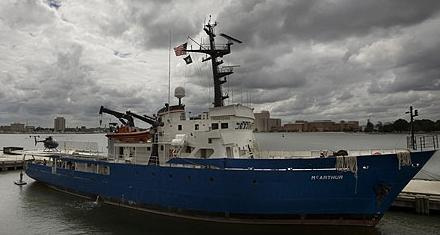Blackwater has bomb-proof Grizzly APC (armored personnel carriers).
In March 2006, Cofer Black, vice chairman of Blackwater USA, allegedly suggested at an international conference in Amman, Jordan, that the company was ready to move towards providing security professionals up to brigade size (3,000–5,000) for humanitarian efforts and low-intensity conflicts.
Now in 2007, the company is buying a fleet of aircraft and ground vehicles, including its own airship, hoping to win contracts to secure failed states before the U.N. arrives. Blackwater also utilizes UAVs and other robotic vehicles.
As Blackwater fights to keep its State Department security contracts in Iraq, the company is expanding into areas where its competitors have not. Blackwater recently purchased the McArthur, a naval vessel intended for disaster response and training, but that can also be used as a “mothership” for launching peacekeeping operations.

The 183 ft McArthur has been refurbished with “state of the art navigation systems, full GMDDSS communications, SEATEL Broadband, dedicated command and control bas, helicopter decks, hospital and multiple support vessel capabilities.”
Blackwater now produces the Grizzly, a bomb-resistant vehicle that sports a unique diamond-shaped hull. In addition to a fleet of fixed and rotary-wing aircraft, Blackwater has also moved into unmanned airships, building the Polar 400, a dirigible that would fly between 5,000 and 15,000 feet, and is designed to monitor border areas or track terrorists. The airship could provide surveillance, or eventually, transport into war-ravaged areas.
Blackwater owns more than 20 aircraft, is seeking to acquire a Super Tucano light combat plane from the Brazilian manufacturer Embraer. The propeller-driven planes, which can be outfitted with up to 1-1/2 tons of machine guns, bombs and missiles, are used by Brazil and Colombia to battle insurgents and drug smugglers. Blackwater is buying a two-seat model to be used for pilot training.
All this new technology is part of a broader company expansion. Blackwater argues that it can provide a “transition force” to take over security for failed states after military operations are finished.
Blackwater believes it could, in addition to providing security, also deliver aid and oversee disaster relief. This is work now done primarily by non-governmental organizations, or NGOs, and humanitarian groups. Blackwater executives have suggested sending a private peacekeeping force into Darfur, for instance.
The Grizzly vehicle can ferry peacekeepers, or in an ambulance version, could be used to transport NGO workers and patients. And the airship could provide surveillance, or be used to ferry supplies for disaster relief.
Doug Brooks, president of International Peace Operations Association, which represents private security contractors (though not Blackwater, which pulled out of the group in October), says in many parts of the world, “private companies are in fact holding peace operations together.”
The industry, in Brooks’ view, is in part a natural consequence of the West’s unwillingness to commit its military forces to troubled regions, leading to what he calls “Westernless peacekeeping.” Globally, such contracting is a $20 billion industry, and growing, he contends.
FURTHER READING
The Blackwater company and the private military industry is trending towards the levels of forces seen in Roman times. During that period, mercenaries made up a large part of the forces that fought.
The history of mercenaries is mixed throughout the history of war There is an ebb and flow to how many mercenaries there are. There are the most mercenaries when a wealthy and powerful force has a difficulty gettings its citizenry to fight in its armies. This situation creates more demand for mercenaries.

Brian Wang is a Futurist Thought Leader and a popular Science blogger with 1 million readers per month. His blog Nextbigfuture.com is ranked #1 Science News Blog. It covers many disruptive technology and trends including Space, Robotics, Artificial Intelligence, Medicine, Anti-aging Biotechnology, and Nanotechnology.
Known for identifying cutting edge technologies, he is currently a Co-Founder of a startup and fundraiser for high potential early-stage companies. He is the Head of Research for Allocations for deep technology investments and an Angel Investor at Space Angels.
A frequent speaker at corporations, he has been a TEDx speaker, a Singularity University speaker and guest at numerous interviews for radio and podcasts. He is open to public speaking and advising engagements.

